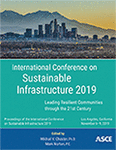International Conference on Sustainable Infrastructure 2019
IoT Integration of Infrastructure Systems in Smart Cities: The Impact of Interdependencies in Building Energy Systems
Publication: International Conference on Sustainable Infrastructure 2019: Leading Resilient Communities through the 21st Century
ABSTRACT
Capitalizing on technology to establish smart city capacities that respond to urbanization, sustainability, and resilience challenges have gained momentum in recent years. The increased use of sensors and systems—e.g., Internet of Things (IoT)—has enabled more cohesive networks among and between human and infrastructure systems to support services for complex cities. However, it is still considerably uncertain how IoT can improve sustainability and resilience in city operations due to interdependencies that exist between the sub-system operations. Lack of effective IoT system integration can further hinder its ability to improve real-time interoperability of infrastructure systems. Here, we examine the interdependencies between buildings’ sub-system operations (operations efficiency) in an urban university campus, to identify the key drivers of sub-system interdependencies that are likely affecting efficiency rankings (energy performance) across buildings. High levels of interdependence among infrastructure sub-systems are an important consideration in making cities smarter because of such systems’ close association with urban vulnerability and resilience. Our study highlights the need for understanding systems’ unique operations infrastructure beyond global efficiency rankings when examining their scope of readiness for efficiency interventions and developments that are intended to foster smart sustainable cities.
Get full access to this chapter
View all available purchase options and get full access to this chapter.
ACKNOWLEDGEMENTS
The National Science Foundation under Grant No.1837021 supported this study. Any opinions, findings, and conclusions or recommendations expressed in this material are those of the authors and do not necessarily reflect the views of the National Science Foundation. This study was supported in part by the Graphics, Visualization, and Usability (GVU) Center and the Institute for People and Technology (IPaT) at Georgia Institute of Technology. We appreciate the support of Georgia Tech Facilities in this project.
REFERENCES
Bibri, S. E., and Krogstie, J. (2017). “Smart sustainable cities of the future: An extensive interdisciplinary literature review.” Sustainable Cities and Society, Elsevier, 31, 183–212.
Colding, J., Colding, M., and Barthel, S. (2018). “The smart city model: A new panacea for urban sustainability or unmanageable complexity?” Environment and Planning B: Urban Analytics and City Science, SAGE Publications Sage UK: London, England, 2399808318763164.
Ejaz, W., Naeem, M., Shahid, A., Anpalagan, A., and Jo, M. (2017). “Efficient energy management for the internet of things in smart cities.” IEEE Communications Magazine, IEEE, 55(1), 84–91.
Energy Star. (n.d.). “The business case for energy efficiency.” <https://www.energystar.gov/buildings/about-us/how-can-we-help-you/build-energy-program/business-case> (Apr. 8, 2018).
EPA. (2016). ENERGY STAR Guidelines for Energy Management. U.S. Environmental Protection Agency.
Francisco, A., Mohammadi, N., and Taylor, J. E. (2018). “Evaluating Temporal Shifts in City Scale Building Energy Benchmarks.” Construction Research Congress 2018, 450–460.
Iain, C., and Calhoun, K. (2016). “Old Buildings Are U.S. Cities’ Biggest Sustainability Challenge.” Harvard Business Review.
Jolliffe, I. T. (1986). “Principal component analysis and factor analysis.” Principal component analysis, Springer, 115–128.
Mohammadi, N., and Taylor, J. E. (2017a). “Smart City Digital Twins.” IEEE Symposium Series on Computational Intelligence (SSCI), IEEE, 1–5.
Mohammadi, N., and Taylor, J. E. (2017b). “Urban infrastructure-mobility energy flux.” Energy, Elsevier Ltd, 140, 716–728.
Sharp, T. (1996). “Energy benchmarking in commercial office buildings.” Proceedings of the ACEEE, 321–329.
UN-Habitat. (n.d.). “Energy.” UN Habitat for a Better Urban Future, <https://unhabitat.org/urban-themes/energy/> (Apr. 10, 2018).
UN SEforALL. (2011). “Sustainable Energy for All: an Overview.” <http://www.un.org/millenniumgoals/pdf/SEFA.pdf> (Aug. 12, 2018).
United Nations. (2015a). “The Sustainable Development Agenda.” Department of Public Information, <http://www.un.org/sustainabledevelopment/development-agenda/> (Apr. 10, 2018).
United Nations. (2015b). SDG 11: Sustainable Cities and Communities: Why it matters?
United Nations. (2015c). SDG 12: Responsible Consumption & Production: Why it matters?
Vitali, M., and Pernici, B. (2016). “Interconnecting processes through IoT in a health-care scenario.” Smart Cities Conference (ISC2), 2016 IEEE International, IEEE, 1–6.
Vlacheas, P., Giaffreda, R., Stavroulaki, V., Kelaidonis, D., Foteinos, V., Poulios, G., Demestichas, P., Somov, A., Biswas, A. R., and Moessner, K. (2013). “Enabling smart cities through a cognitive management framework for the internet of things.” IEEE communications magazine, IEEE, 51(6), 102–111.
Information & Authors
Information
Published In
International Conference on Sustainable Infrastructure 2019: Leading Resilient Communities through the 21st Century
Pages: 274 - 280
Editors: Mikhail V. Chester, Ph.D., Arizona State University, and Mark Norton, Santa Ana Watershed Project Authority
ISBN (Online): 978-0-7844-8265-0
Copyright
© 2019 American Society of Civil Engineers.
History
Published online: Nov 4, 2019
Authors
Metrics & Citations
Metrics
Citations
Download citation
If you have the appropriate software installed, you can download article citation data to the citation manager of your choice. Simply select your manager software from the list below and click Download.
